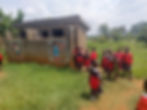
Bringing Dignity and Clean Water to Ugandan Schools: A Story of Urgency, Collaboration and Hope
Jul 24, 2025
4 min read
6
53
0
In early 2025, two schools in rural Uganda, Kayenje Church of Uganda Primary School and Magooli Children’s Education Centre, faced urgent WASH (Water, Sanitation and Hygiene) challenges that threatened the health, safety, and education of hundreds of children. What followed was a story of swift action, international collaboration, and a shared commitment to dignity, safety, and sustainable education.
A Crisis at Magooli: When Toilets Become a Threat

Magooli Children’s Education Centre, located in Namayingo District in eastern Uganda, provides education, safety and belonging for over 420 orphans and vulnerable children. But in March 2025, the school’s seven-year-old pit latrines reached crisis point. Overflowing and unsanitary, they posed an immediate health risk. A routine inspection by the District Education Office led to a stark ultimatum: build new sanitation facilities within four weeks or face closure.

For a school with no financial reserves, the situation seemed impossible.
The timing couldn’t have been worse. Heavy rains increased the risk of communicable disease, and the girls’ toilets had become unusable, flies and odours were affecting dormitories and classrooms nearby. Education for hundreds of pupils was at stake.
Emergency Action: A Collaborative Response
Thanks to a generous anonymous donor in Lincolnshire, construction on a new 5-stance ventilated improved pit (VIP) latrine began immediately.
The toilet block was traditional in style but enhanced with:
Proper ventilation for odour control
An accessible stall with ramp for pupils with disabilities
A 10,000-litre water tank for handwashing and hygiene
A secure gate for post-cleaning safety


By mid-May, the work was completed. Local inspectors approved the facilities, and the school was cleared to reopen on 26th May. Later, a delegation from Uganda’s Ministries of Health and Education, alongside the Namayingo District Education Office, visited the school. Their verdict? Magooli had the best sanitation infrastructure they had seen. The school is now set to receive a Certificate of Recognition. The officials also recommended the installation of a small incinerator near the latrine block, to support hygienic disposal of sanitary pads, reduce strain on the latrine system, and further improve health and dignity for female pupils.
Meanwhile at Kayenje: A Water Crisis Becomes a Safety Emergency


Over in western Uganda, Kayenje Primary School (twinned with St Peter at Gowts Primary School in Lincoln through the British Council’s Connecting Classrooms programme) faced a different but equally urgent problem.
The school’s water tanks, installed in 2011, had failed. With no functional water supply, pupils walked up to three miles twice a day to collect water from local waterholes, which were also frequented by wild animals. In April 2025, tragedy was narrowly avoided. A nine-year-old girl was attacked by a hyena while fetching water. Though she wasn’t injured, the incident shocked the community. Parents began pulling their children out of school, fearing for their safety.
Swift Support from Lincolnshire
In response, Emily Mayer, Headteacher at St Peter at Gowts, redirected existing fundraising to co-finance two new 10,000-litre tanks. The majority of funding came from an anonymous donor, and installation was completed by 31st May.
These efforts were made possible in no small part thanks to Chris Williams, a senior member of the Global Learning Association and a long-time champion of school partnerships between Lincolnshire and Uganda. His work through Connecting Classrooms has kept these international links alive long after the original programme ended.
The Rotary Club of Lindum Lincoln, through its International Committee Chair, Murray Kirkham, also played a vital role in coordinating efforts, funding, and future planning.
Planning for the Future: A Sustainable Vision
While these emergency measures stabilised the situation, partners are now working on Phase Two: delivering a long-term, scalable WASH solution for both Kayenje and Magooli, and beyond.
These prefabricated units will be designed for:
Durability and hygienic drainage
Wheelchair accessibility
Solar-powered lighting
Rainwater harvesting
Adaptability for use in other rural Ugandan schools
PCC Consultants Ltd has joined the project to provide technical expertise in water and sanitation infrastructure, working closely with local contractors and stakeholders.
“The pioneering work of Victorian engineers transformed sanitation in Britain and laid the foundations of public health,” said Peter Cole, PCC’s Director. “It’s a sobering thought that many communities still lack these essentials. This project, aimed at improving sanitation at Kayenje and Magooli, is a small but powerful act of dignity, safety, and hope.”
A Shared Effort, A Shared Impact
These projects are deeply rooted in long-standing relationships between schools in Lincolnshire and Uganda, first forged through the British Council's Connecting Classrooms initiative over a decade ago. Thanks to the sustained efforts of people like Chris Williams, local school communities and international volunteers, those links continue to create meaningful change.
The work supports the UN Sustainable Development Goals, particularly:
SDG 4: Quality Education
SDG 5: Gender Equality
SDG 6: Clean Water and Sanitation
More Than Toilets and Tanks
For the girls and women at Kayenje and Magooli, many of whom now board at school to avoid long and dangerous walks, this work is about more than infrastructure. It’s about safety, dignity, and the right to learn without barriers.
We are proud to play a role in this effort, a lasting reminder that engineering is not just technical work. It’s an instrument of justice, compassion, and progress.




